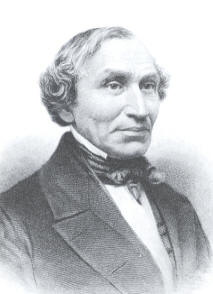
After spending a solid century or so focusing on issues surrounding settlement, local politics, and a good old fashioned war for independence, the new America was finally ready to tackle “the good stuff” (A.K.A. the development of a nationwide practice of music). While the reforms of sacred music launched efforts to create music based education in schools and the constantly evolving state of folk music struck the heart strings of different American communities and cultures in the early nineteenth century, there still lacked a realistic and affordable market for purchasing family instruments. How, you may wonder, did earnest, well-adjusted middle class early Americans perform their favorite appropriated spirituals and secular but not sacred Billings hymns? The sad truth is: they simply couldn’t…
That is, until our good friend Jonas Chickering entered the musical scene!
Born and raised in the heart of New England, Chickering spent the first chunk of his career in small piano manufacturing partnerships, cranking out around 30-40 pianos a year. It wasn’t until 1830, when he joined forces with a wealthy Boston shipping merchant by the name of John Mackay, that he was able to create an affordable, international market of square, cabinet upright, and grand pianos. Not only did Chickering lay down the base of the American piano manufacturing system, but he also, with the help of cohort Alpheus Babcock, developed a revolutionary one-piece cast-iron frame that gave the piano a higher resistance to the state’s harsher climate and allowed for higher tension in the strings, resulting in richer tones.
My purpose in writing on this seemingly historically insignificant 19th century piano developer and distributor is not to offer a thinly veiled biography, but to establish the importance of Chickering’s work in his time. While singing schools and music education systems spread like wildfire in the late 1700’s/early 1800’s, there still was very few means for the “common” middle class society to enjoy music through practice and performance. Especially in an era of America where folk music was being compiled and distributed into the hands of individuals, Chickering’s development and market for an affordable, durable piano was crucial in a time that lacked professional and amateur musicians alike. Since Chickering’s company became a global business in 1851, it is estimated that the amount of piano’s sold to individuals has gone from 1 in 4,800 Americans to 1 in 252 by the year of 1910. This is absolutely vital to the stories of countless musicians, including Pete Seeger, who was inspired by folk music that was performed by his parents at a young age. Chickering helped music become a common, daily occurrence in an average American household, and as a result is partially responsible to the pianos located in my own and most, if not all, of the consumer’s of this blogpost’s childhood homes.
As a closing statement for the story of Chickering, I feel as if it’s worth mentioning several primary sources that disclose to us the appreciation and praise that fellow musical visionaries had for the piano maker’s impact. Louis Moreau Gottschalk, an influential and well known pianist and composer in the 19th century says the following of Chickering’s piano:
“I like their tone, fine and delicate, tender and potetic.” [addtionally, it allowed him to achieve] “tints more varied than those of other instruments.”
In addition to receiving praise from fellow musicians and prestigious honors (his square piano won a medal and was displayed at the Great Exhibition in London in 1851), Chickering received a posthumous tribute in the equally booming sheet music market. In a publication of a piece entitled “Funeral March, Op. 10 in C Minor: Composed as a Sincere Tribute of Respect To the Memory of Jonas Chickering,” composer William R. Babcock offers his condolences not only through music, but with an additional portrait, a not to his family, and a humbling illustration of angels surrounding his grave. It is clear that Chickering not only gave the gift of music to countless Americans, but was also praised on the quality and impact of his work.

SOURCES
Babcock, Wm R. “Funeral March.” 164.019 – Funeral March. | Levy Music Collection. Accessed October 23, 2017. http://levysheetmusic.mse.jhu.edu/collection/164/019.
Crawford, Richard. Americas musical life: a history. New York: W.W. Norton, 2005
. “Chickering.” Grove Music Online. Oxford Music Online. Oxford University Press, accessed October 23, 2017, http://www.oxfordmusiconline.com/subscriber/article/grove/music/05571.
